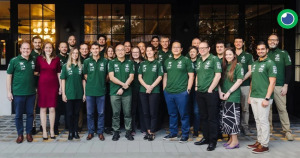European consortium scores €6 million for eco-friendly CT technology
por John R. Fischer, Senior Reporter | December 19, 2023
CT
European News
X-Ray

NetZeroAICT Consortium
Horizon Europe, a seven-year research initiative by the European Union, has granted €6 million (over $6.5 million) to the NetZeroAICT Consortium to fund further development of and eventually commercialize its CT Digital Contrast technology for reducing CT imaging environmental footprints and make exams safer.
According to the consortium, 180 million contrast-enhanced CT scans are performed annually and waste 42,000 tons of single-use packaging, 900 tons of surgical steel (needles), 90,000 tons of plastic tubing, and 150,000,000 kilowatt hours in energy consumption. This contributes, on average, to three megatons of CO2 emissions per year. Additionally, CECTs generate 200,000 tons of iodine contamination in water annually, contributing to pharmaceutical pollution.
The radiocontrast media can be toxic and lead to kidney failure. They can also cause allergic reactions in patients, and the needle insertions come with their own risks. CT Digital Contrast, a form of AI Software as Medical Devices (AISaMDs), uses AI and deep learning to extract high levels of data from non-contrast CT scans and synthesizes contrast digitally.

 “By implementing ‘Digital Contrast’ for scans globally, we aim to reduce 30% of the CO2 emissions and iodine RCM waste generated from CECTs by 2033,” said the consortium in a statement.
“By implementing ‘Digital Contrast’ for scans globally, we aim to reduce 30% of the CO2 emissions and iodine RCM waste generated from CECTs by 2033,” said the consortium in a statement.
The funding will be used to develop and validate five use cases for the technology over the next four years, with one of the end goals being to help the EU become climate-neutral by 2050, as part of its NetZero targets in the European Green Deal.
The consortium is made up of 20 partners across academia, healthcare, and industry that will work together to break down silos to enhance information exchange. They have developed privacy-preserving technology and international legal frameworks to enable international health data sharing. These measures, they say, are highly compliant with privacy regulations, including the standard EU General Data Protection Regulation.
They will also develop a reference framework for deploying AISaMDs through a sustainable pipeline using green computational architectures and evaluate the social and life cycle impacts associated with their technology.
Members include Collective Minds Radiology, Rhino Healthtech, Z-visie, EscherCloud Holding BV, Unilabs AB, Betthera S.R.O., Amires SRO, Centre Hospitalier Universitaire de Nice, Uniwersytecki Szpital Kliniczny w Opolu, Panepistimiako Geniko Nosokomeio Irakleiou, Gasthuiszusters Antwerpen, Algemeen Ziekenhuis Sint-Jan Brugge-Oostende Autonome Verzorgingsinstelling, Universidade de Sao Paulo, Universidade Federal Fluminense, the Chancellor, Masters and Scholars of the University of Oxford, Aisentia Limited, Unity Insights Limited, University of Leicester, University of Glasgow, and University of Sydney.
Back to HCB News
According to the consortium, 180 million contrast-enhanced CT scans are performed annually and waste 42,000 tons of single-use packaging, 900 tons of surgical steel (needles), 90,000 tons of plastic tubing, and 150,000,000 kilowatt hours in energy consumption. This contributes, on average, to three megatons of CO2 emissions per year. Additionally, CECTs generate 200,000 tons of iodine contamination in water annually, contributing to pharmaceutical pollution.
The radiocontrast media can be toxic and lead to kidney failure. They can also cause allergic reactions in patients, and the needle insertions come with their own risks. CT Digital Contrast, a form of AI Software as Medical Devices (AISaMDs), uses AI and deep learning to extract high levels of data from non-contrast CT scans and synthesizes contrast digitally.
Quality, speed, and peace of mind
GE HealthCare’s Repair Center Solutions are an ideal complement to your in-house service team. We service a broad range of mobile devices, including monitors and cardiology devices, parts, and portable ultrasound systems and probes.

The funding will be used to develop and validate five use cases for the technology over the next four years, with one of the end goals being to help the EU become climate-neutral by 2050, as part of its NetZero targets in the European Green Deal.
The consortium is made up of 20 partners across academia, healthcare, and industry that will work together to break down silos to enhance information exchange. They have developed privacy-preserving technology and international legal frameworks to enable international health data sharing. These measures, they say, are highly compliant with privacy regulations, including the standard EU General Data Protection Regulation.
They will also develop a reference framework for deploying AISaMDs through a sustainable pipeline using green computational architectures and evaluate the social and life cycle impacts associated with their technology.
Members include Collective Minds Radiology, Rhino Healthtech, Z-visie, EscherCloud Holding BV, Unilabs AB, Betthera S.R.O., Amires SRO, Centre Hospitalier Universitaire de Nice, Uniwersytecki Szpital Kliniczny w Opolu, Panepistimiako Geniko Nosokomeio Irakleiou, Gasthuiszusters Antwerpen, Algemeen Ziekenhuis Sint-Jan Brugge-Oostende Autonome Verzorgingsinstelling, Universidade de Sao Paulo, Universidade Federal Fluminense, the Chancellor, Masters and Scholars of the University of Oxford, Aisentia Limited, Unity Insights Limited, University of Leicester, University of Glasgow, and University of Sydney.
Back to HCB News
1(current)
You Must Be Logged In To Post A CommentRegistroRegistrarse es Gratis y Fácil. Disfruta de los beneficios del Mercado de Equipos Médicos Nuevos y Usados líder en el mundo. ¡Regístrate ahora! |
|










